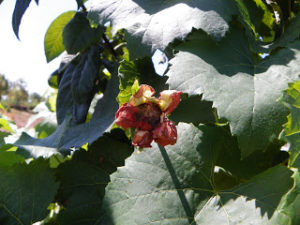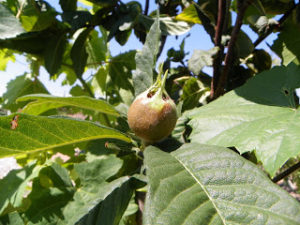A Medlar is a pome fruit native to areas surrounding the Black Sea, which is attached to the Mediterranean sea. That means that the Medlar is a great fruit tree to plant in our Mediterranean climate, it will save you water. Medlars do need a period of frost that we don’t have, however they don’t need it to fruit or to start growing from a deciduous period, they need that period of frost for the fruits to become bletted. Bletting is what happens to a fruit when it has become over ripe. Think of Bananas when they are ready for banana bread, or Persimmons when they are soft and no longer astringent. Medlars that haven’t been frozen or haven’t gone through a frost period will often be hard, I have heard that if you keep them long enough, they won’t need to be frozen or go through a frost period, but I haven’t tried that yet.

In the demo garden, the other side of this medlar has been eaten.

Just missed the bloom, but it’s still kind of pretty in that wabi-sabi rustic way.
Here is a picture of a dying bloom. I just missed the bloom by a couple of days, I’ll need to time it better next time. The flowers are generally white and actually quite pretty.
The term “medlar” was often used in English literature to describe people negatively. The reason is because medlars need to blett in order to become good. So when someone was called a medlar it was like saying that they are only good when they are rotten. It is quite likely that this is what caused the medlar to lose its popularity as a quality fruit. A similar trend was seen recently with prunes and its relationship with digestion (you’ll often see prunes sold as dried plums in order to get away from that stigma).
Medlars were once very popular to new immigrants in America. Eastern and northern Europeans brought the trees with them to the U.S. and and for some time were a staple. Eventually they lost popularity in the United States. There are some relatively new Medlar farms in California’s valleys so hopefully you may get to see them in stores some time soon. People don’t seem to be calling each other medlars anymore (meddler maybe) so they may make a comeback. Interestingly, they have never lost popularity in the middle east in eastern Europe.
The great thing about having your own garden, whether it is at home or at school, is that you get a chance to grow some uncommon foods. I enjoy being able to share medlars with new gardeners as a new fruit that can save space (they only get to be about 10 feet tall), have a beautiful bloom, and provide a delicious fruit. If you want to grow these you’ll need to special order them as haven’t found them in any local nurseries.
